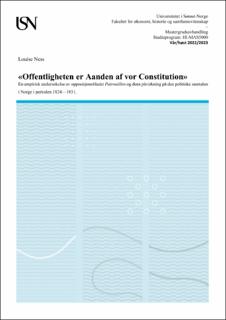| dc.contributor.advisor | Nymark, Kristian Holen | |
| dc.contributor.author | Ness, Louise | |
| dc.date.accessioned | 2023-06-30T16:41:55Z | |
| dc.date.available | 2023-06-30T16:41:55Z | |
| dc.date.issued | 2023 | |
| dc.identifier | no.usn:wiseflow:6825505:54274284 | |
| dc.identifier.uri | https://hdl.handle.net/11250/3074816 | |
| dc.description.abstract | Denne masteren har undersøkt opposisjonsavisen Patrouillen, og hvilken påvirkning den hadde på den politiske offentlige samtalen. For å finne ut av dette har jeg tatt for meg en rekke utgaver av Patrouillen, samt sett på stortingssesjoner og andre samtidsaktørers beretninger for å finne frem til funn som korrelerer og kan gi et godt bilde av dens påvirkning på offentligheten. Oppgaven har sett på hvilke politiske ideologier som var styrende, og hvilke sosiale og kulturelle faktorer som regulerte samtiden etter 1814, og deretter plassert Patrouillen inn i dette.
Patrouillen var i perioden 1824—1831 Norges fremste opposisjonsblad, og forskning har stadig trukket frem avisen som et toneangivende opposisjonsblad uten at det har foreligget noen egen forskning eller analyse på Patrouillen som nettopp dette. Det er det denne masteroppgaven skal bidra med til. Gjennom dens dekning av politiske forhandlinger på Stortinget, sentrale hendelser i samfunnet og kritiske innlegg om samtidens debatter, bidro Patrouillen til å utvide offentligheten hvor den politiske samtalen fant sted. Grunnloven som ble vedtatt i 1814 hadde åpnet for trykkefrihet i Norge, og la til rette for en fremvekst av nye tidsskrifter. Trykkefriheten ble vernet om som en av Grunnlovens hjørnestener. Gjennom trykken kunne offentligheten underrettes og oppdateres på politiske forhandlinger i Christiania, og delta i offentligheten.
Men aviser var avhengig av portomoderasjon for kunne nå ut, ettersom postgangen var en kostbar affære. I 1826 fikk Patrouillen innvilget portomoderasjon, som førte til at avisen kunne nå ut til et større publikum på nasjonalt plan og få et bredere nedslagsfelt. Dette var ideologisk viktig for redaktør Ludvig Mariboe som gjennom sin politiske karriere kjempet for å utvide den politiske offentligheten med slagordet: «Offentligheden er Aanden af vor Constitution».[1]
Han var en engasjert opposisjonspolitiker som kjempet for allmuens tilgang på politiske forhandlinger, ettersom det i tiden etter 1814 var den styrende eliten av embetsmenn som i hovedsak dominerte den politiske samtalen. Gjennom sine politiske rapporter fra Stortinget og debattinnlegg, var avisen med på å bidra til en mer åpen og tilgjengelig offentlighet for et gradvis mer utvidet publikum. Patrouillen ble lagt ned i 1831 etter at Mariboe ble valgt inn på Stortinget, men la et betydelig grunnlag for nye opposisjonsblader som fulgte etter.
[1] Patrouillen, 17.2.1830, s. 2 | |
| dc.description.abstract | This master's has examined the opposition newspaper Patrouillen, and what influence it had on the political public conversation. In order to find this out, I have examined a number of editions of Patrouillen, as well as looked at parliamentary sessions and other contemporary accounts in order to find findings that correlate and can give a good picture of its influence on the public. The assignment has looked at which political ideologies that were applicable, and which social and cultural factors regulated the contemporary period after 1814, and then placed the Patrouillen within this. In the period 1824-1831, Patrouillen was Norway's foremost opposition paper, and research has constantly highlighted the paper as a leading opposition paper without there having been any separate research or analysis of Patrouillen. This is what this master's thesis will contribute to. Through its coverage of political proceedings in the Storting, key events in society and critical posts on contemporary debates, Patrouillen helped to expand the public where the political conversations took place. The constitution that was established in 1814 secured the freedom of the press in Norway, and facilitated the emergence of new periodicals. Freedom of the press was protected as one of the cornerstones of the Constitution. Through the press, the public could be informed and updated on political negotiations in Christiania, and participate in the public. But newspapers depended on postage moderation to be able to reach out, as postage was an expensive affair. In 1826, Patrouillen was granted postage moderation, which led to the newspaper being able to reach a larger audience on a national level and gain a wider audience. This was ideologically important for editor Ludvig Mariboe, who throughout his political career fought to expand the political public with the slogan: "Offentligheden er Aanden af vor Constitution",[1] meaning: the public is the spirit of this constitution. He was a committed opposition politician who fought for common people's access to political negotiations. In the period after 1814 it was the ruling elite of officials who essentially dominated the political conversation. Through its political reports from the Storting and debate entries, the newspaper helped to contribute to a more open and accessible public for a gradually wider audience. Patrouillen was closed in 1831 after Mariboe was elected to Parliament, but laid a significant foundation for new opposition magazines that followed.
[1] Patrouillen, 17.2.1830, s. 2 | |
| dc.language | nob | |
| dc.publisher | University of South-Eastern Norway | |
| dc.title | Offentligheden er Aanden af vor Constitution | |
| dc.type | Master thesis | |
